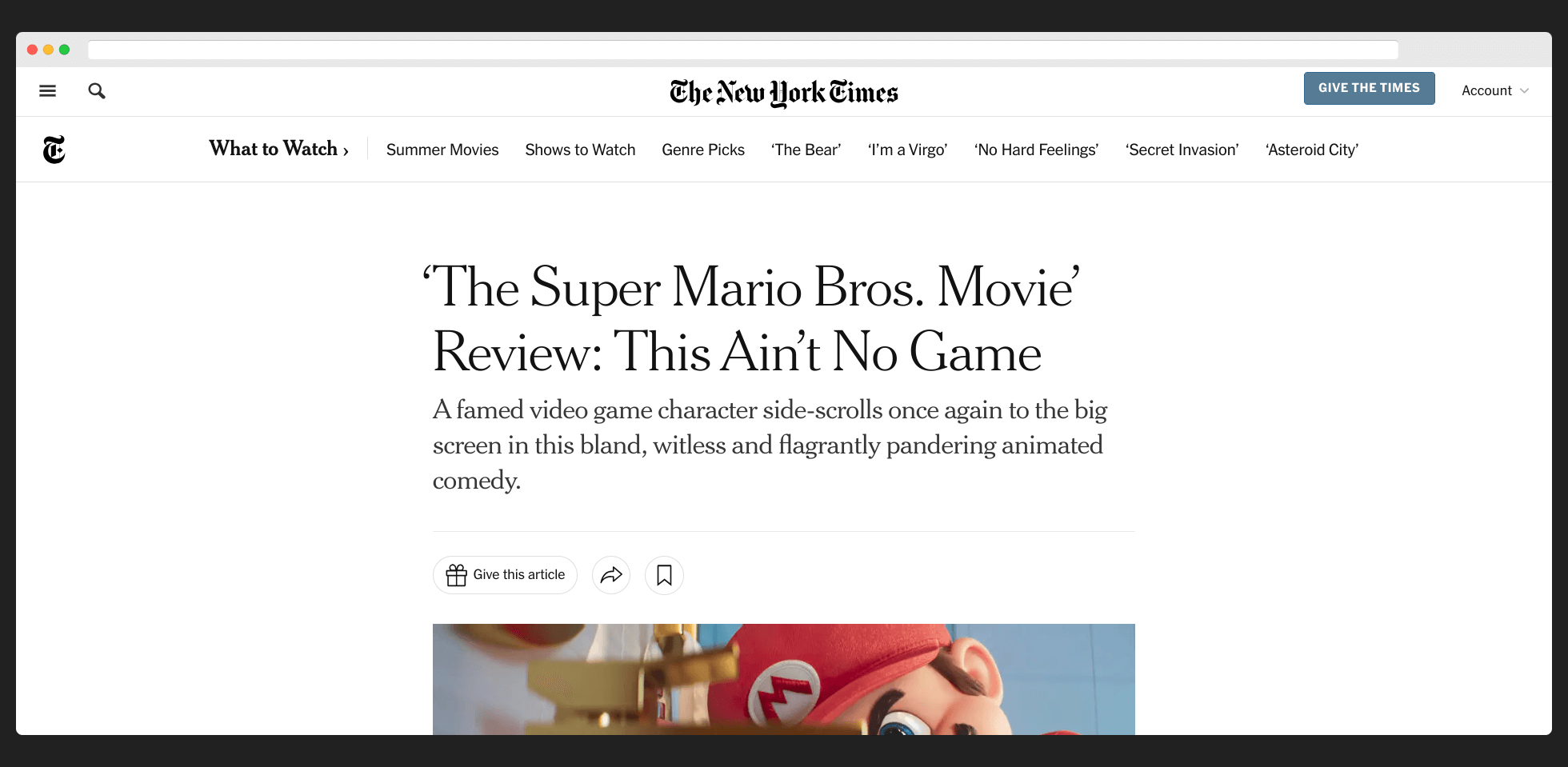Quality
Quality fled across the desert, and the wordslinger followed.
My favorite series of all time just might be The Dark Tower by Stephen King. The opening line irresistibly sucks me in, "The man in black fled across the desert, and the gunslinger followed." It's impossible to stop reading. It's better than Harry Potter. Dare I say it? It's better than Lord of The Rings. (If they can't find me after this, you know which fan bases to investigate first.) But mega-fanbase or not, the Dark Tower series is of the highest Quality.
I invite you to join me in a search for Quality. Like The Gunslinger's opening line, the idea of Quality irresistibly pulls me in. What on earth is it? More importantly: how can I have it? How can I make it? If the answer is obvious to you, it's not to me. I've tried so many times to capture Quality, only for it to slip through my fingers. I can assure you honestly at the outset that, although I have a few vague ideas, I have no clue where this search will lead. So, let's step into the desert and give Quality a good chase.
Although searching for Quality in my favorite series would seem a sensible thing to do, I feel compelled to first look somewhere a bit more lighthearted. So, instead, let's turn our attention to Super Mario.
Please hear me out as I assert this is a movie of highest Quality.

I'm joking, right? It's a fun movie, sure. But high Quality? Surely I should be embarrassed to mention "The Super Mario Bros" in the same post about Quality as "Lord of The Rings."
Shouldn't it matter that: Chris Pratt doesn't know how to do an Italian accent? Half the scenes are in slow-motion? It's clearly trying to jumpstart a cinematic universe? They never really bother to explain why the Mario Bros are sucked into another universe?
No!
Why not? Because of this guy:

My son Kit loves Mario. Mario Kart is his favorite game. Catch him in his Super Mario shirt, his Mario Kart shirt, or (in cold weather) his Super Mario sweater. Did I mention he asked for (and got) a Mario-themed birthday this year? It's a fairly common occurrence in my house to be relaxing in the morning, drinking coffee, only to hear (in the deepest growly voice a five-year-old can muster), "BOWSER". I know I better put my coffee down because things are about to get real.
So, when I went to see the Super Mario Bros movie, I didn't care about: the animation style, the soundtrack, or the story. Although, to be honest, I liked all of them. I just cared that I could enjoy seeing some Super Mario action on the big screen with my little guy.
We laughed, we cried, and we cheered when our favorite characters showed up on the screen (Donkey Kong for me, Peach for my daughter Max, and of course, Mario for Kit). We walked out of that movie with smiles on our faces and Quality in our hearts.
When we arrived home, I began my routine of learning what others thought about the movie. Surely this would be a smashing hit; "recommended viewing for fathers and sons everywhere!" Surprisingly, my evaluation of Super Mario's Quality didn't quite line up with the critics.

Bland, witless, and pandering? How could this critic and I end up with such a different evaluation of Quality? This is (of course) an absurd question. I might as well ask, "How can people have different opinions?" But I do believe it's a useful question to ask, even if it's absurd. Indeed, I'd say this question is an important part of an entire Philosophy field: esthetics. Esthetics (or aesthetics) is focused on the idea of value judgment.
At the beginning of our search, I unknowingly laid out our ultimate esthetic goal: to discover what Quality is and how to harness it. But immediately I've run across another question that I must answer first: how can two people end up with opposing assessments of Quality for the same thing?
This question is more difficult than it seems. One might respond, "because they like different things." This would define Quality as a part of the self, a part of each of us. But this presents problems. If Quality is only opinion or what one likes, why do people bother with arguments at all? We could simply state, "I like this" or "I don't like this." Instead, we say things like, "The Super Mario Bros movie was excellent because..." giving reasons for why we believe it is not just Quality to us but Quality for all.
So, by giving reasons, we're attempting to define Quality as part of the thing which we judge. For example, "The movie was good because the animation was realistic," attributes Quality to the movie's animation. This too is problematic. If Quality is a part of the observed it would not change unless the thing itself changed. But we know this is not the case. I saw the same movie as the critic, yet we disagreed.
I feel another question coming on. Already I feel like I'm opening an esthetic Russian nesting doll. Now I wonder, where does Quality exist? In the observer or the observed?

There are reasons to believe Quality could exist on either side. For the observer, we know an assessment of Quality can differ between people. That's the basis for this entire discussion. On the other side, we know a person may change their assessment based on the object observed. They may also change their assessment based on changes to the observed object.
Just a moment ago, we saw this play out over Super Mario. The critic placed quality in the observed when they attempted a rational analysis of the film. Asking: Did the story have plot holes? Was the lore consistent with canon? Were the characters true to their game counterparts? These "objective" or a priori methods of analysis certainly yielded answers. But did they reveal Quality? Of course, I don't think so, because I disagreed! I did the opposite. I placed Quality in myself (and my son, Kit) when I said Super Mario was Quality because we enjoyed it.
It turns out I've got a bit of backup. You might even say I've got a heavyweight in my corner. Just take a look at this quote from the philosopher Kant, from back in the year 1790.
If someone takes me to
a playthe Super Mario movie and it pleases my taste, then he can adduce all the rules established as proofs that theplaymovie lacksbeautyQuality. I will stop my ears, listen to no reasons and arguments, and would rather believe that those rules of the critics are false than allow that my judgment should be determined by means of a priori grounds of proof, since it is supposed to be a judgment of taste and not of the understanding of reason.Immanuel Kant Critique of the Power of Judgment (paraphrase)
Immanuel Kant goes to the Super Mario movie, finding himself deeply moved by the film. Afterward, he reads a scathing review from The New York Times movie critic. The critic denounces Super Mario as witless and pandering. Does Kant care? Kant does not care. He stuffs his fingers into his ears, chanting, "I can't hear you!" He argues the critic relies on a priori justifications for his critique. Meaning, the critic decided with reason alone—without empirical evidence—the movie should be witty and should not pander to superfan or childish desires. So, Kant shoots back his retort—complete with a priori justification—the movie should pander and need not be witty at all. What are his justifications? They are not important. The point is he is not moved by the critic's argument.
What's this all about? Kant is saying arguments and reasons are not relevant when assessing traits such as goodness, beauty, or Quality. It is for each person to decide if the object fits the mold. He is not only saying, "man is the measure of all things" but "each man is the measure of all things"—at least when it comes to esthetic value judgment.
Now, this is a total bummer. Not for the subjectivist—content to lean against the fence to watch Quality graze—but absolutely for the person who desires to grab Quality by the horns and ride it into town. This is not to say that one's opinion is merely an opinion, without worth or weight of its own. It's simply to say that it's not useful for anyone who wants to consistently replicate Quality.
I remember my goal is to not only understand but to harness Quality. So, I must continue if I am to find anything useful. But continue where? For now, my only idea is to investigate the definition of the word: what does it mean? where does it come from?
First, the easy part. What does Quality mean? For this, I'll consult my favorite dictionary (and I hope you won't judge me too harshly for having one): Webster's 1913; the last edition written and edited by lexicographer Noah Webster.
Quality Noun
- That which makes, or helps to make, anything such as it is; anything belonging to a subject, or predicable of it; distinguishing property, characteristic, or attribute.
- The condition of being of such a sort as distinguished from others; nature or character relatively considered, as of goods; character; rank.
We seem to have two types of Quality. The first is that which makes something what it is, its attributes (I'll call this "little-q quality"). The second is that which distinguishes something from others, its rank (big-Q Quality).
These are the definitions of quality. However, the dictionary includes another tidbit right at the top: "L. qualitas". Indicating the etymology of this word; it comes from the Latin qualitas. The term was coined by Cicero; unsurprisingly, as he wrote three-quarters of extant Latin writing from his time. Qualitas, in turn, is a calque of the ancient Greek "ποιότης" (poiótēs), literally: "the state of being (-της) a certain nature (ποιός)."

This same little-q quality (ποιότης) appears in ancient Greek philosophy. Like in Plato's dialogue, Theaetetus, where he investigates the nature of knowledge. Here's an excerpt where Socrates discusses qualities.
Socrates: Now perhaps quality (ποιότης) seems an extraordinary word, and you do not understand it when used with general application, so let me give particular examples. For the active element becomes neither heat nor whiteness, but hot or white, and other things in the same way.
Here, quality is "hot" and "white"; quality is attributes. This type of quality can be observed and quantified. It's certainly not the Quality Kant referred to, saying he'd cover his ears if one dared contradict him. No, I expect he'd not cover his ears like a toddler, screaming, "Mario's hat is blue, not red" when someone attempts a description.
Since this is not the difficult form of Quality, I suggest pivoting to the other. The Quality of, "goods; character; rank" according to my friend Webster. But here, he and his dictionary are of no further help. I've already tracked the etymology he provided and it led only to little-q quality.
To get started, I will (carefully) venture into the world of pop-philosophy (OK I admit, I am already there). Robert M. Pirsig provides us with a few ideas in his philosophical novel "Zen and The Art of Motorcycle Maintenance." But I must tread carefully here, as many of his ideas are verifiably false. However, they may yet be salvaged.
Pirsig explores the idea of Quality through two lenses. First, of an insane philosopher, Phaedrus. And second, a cross-country motorcycle road trip with his son. During the long, quiet stretches of motoring through the northwest states, he recounts the story of Phaedrus' search for value. Eventually, after many missteps and failures, Phaedrus runs across an ancient Greek definition of Quality.
"What moves the Greek warrior to deeds of heroism is not a sense of duty as we understand it...duty towards others: it is rather duty towards himself. He strives after that which we translate ‘virtue’ but is in Greek areté (ἀρετή), ‘excellence’—we shall have much to say about areté. It runs through Greek life."
There, Phædrus thinks, is a definition of Quality that existed a thousand years ago.
Now this is an interesting definition of Quality even though it doesn't move the needle for us. "Excellence" is clearly related to big-Q Quality but is hardly different in definition than Quality. We don't know where it resides. Does excellence reside in the observer or the observed? On the surface, it seems to be simply a synonym for Quality.
Also, Pirsig gets confused. He believes the Greeks only had this word for Quality (and quality). But just a moment ago, I showed they had another word for quality: ποιότης (poiótēs) in addition to his ἀρετή (areté) — little-q and big-Q quality, respectively. Even so, it's clear at some point the two concepts merged into one: quality.

Now, I said Pirsig's ideas may be salvageable, right? If only he had looked a little further, he might have found this quote from Aristotle in his Nicomachean Ethics.
It must then be premised that all excellence (areté) has a twofold effect on the thing to which it belongs: it not only renders the thing itself good, but it also causes it to perform its function well. For example, the effect of excellence (areté) in the eye is that the eye is good and functions well; since having good eyes means having good sight. Similarly excellence (areté) in a horse makes it a good horse, and also good at galloping, at carrying its rider, and at facing the enemy.
Now we're cooking! Not vaguely excellence but precisely "to perform its function well." In other words, fulfillment of purpose. What is a performance? What is it to fulfill? It's an action, it's a verb, it's an event. This definition changes everything about big-Q Quality. It's no longer a mystical, subjective "Excellence" but a specific event: the moment an object fulfills the purpose the observer assigned it. Quality is not a thing. Quality is an event!
It's not just any event. It's the moment when the observed meets the observer's expectations. For Aristotle, Quality occurred when his eyes allowed him to see and when his horse galloped him away from an enemy. For Kant, Quality occurred when the play produced a good feeling in his chest.

Why is this so important? Well, I can't find and measure Quality in an object; likewise, I can't measure internal, subjective definitions of excellence; but I can state my purposes and expectations (or ask the same of others), then observe and measure when they are met.
When I meet with an object that fails to satisfy my expectations, I do not experience Quality. But when I meet with an object that satisfies (or exceeds, or redefines) our expectations, I experience Quality.

When Kit and I saw Super Mario, what did we expect? Not a witty, sophisticated exploration of the Super Mario world. No, we wanted to see Mario and Luigi's antics and Bowser wreck some stuff. When Calum Marsh wrote his piece for The New York Times review, what did he expect? I'm not sure, but his review gives a few hints. He complains of the irrationality of using go-karts as a mode of transportation and of the movie's efforts to please fans with nods to the games. This could explain why he could not find Quality but Kit and I could. What he complained about is exactly what we wanted.
This illustrates the utility of the Quality-event. Imagine for a moment that you produced a movie that received a scathing review. Should you throw in the towel, resigned to never create a Quality film? No, instead you should ask what the critic expected from the movie. "I want to see a unique exploration of this world, free from nostalgia-bait and fan-pandering," they say. Immediately you realize that you don't even want to fulfill their expectations; you intended to make a tribute to the silly game you loved as a kid, with all the pandering and nostalgia you can muster. You wanted to create a different form of Quality.
And yet, this still doesn't throw us into the world of "whatever each person likes" because someone else might write a scathing review. You ask them, "what did you expect?" They respond, "I wanted to relive my favorite game memories on the big screen." In this case, you intended to meet their expectations and failed. You wanted to create that form of Quality but couldn't.
Do you see the utility here? We are now able to chase Quality without needing to please every personal opinion. At the same time, we can account for personal expectations. We are simply free to pick and choose which ones we want to fulfill.

I've been chasing Quality for some time now. At this moment, I am close enough to extend my hand and grasp it. When I open my palm, what do I find? (Alternatively, get on with the point already.)
When we started I said I wanted to learn what Quality is and how to harness it. I found that Quality is not a thing, it's an event. Quality occurs when the observed fulfills the expectations of the observer.
Here's how I think I can harness it.
- I must stop thinking of Quality as a thing and start thinking of it as an Event.
- I must stop thinking of a single Quality and start thinking of many Qualities, of which I can freely pick which to pursue.
- To measure Quality, I must observe human interactions with my creation, keeping in mind their individual expectations to see if they are fulfilled.
This may be uncomfortable. Quality is human-centric and therefore subjective. At the same time, Quality comes from the attributes of an object at a single point in time, making them (literally) objective. This duality does not need to be uncomfortable or frightening, however, because it enables us to benefit from the best of both.
Yes, the quality-event still allows us to work within the predictable stability of objectivity. But more importantly, it encourages us to work in the world of humanity; with all its whimsical uniqueness and peculiarities that come from each of our unique perspectives. Blending the two, the quality-event provides a powerful model to pursue Quality.